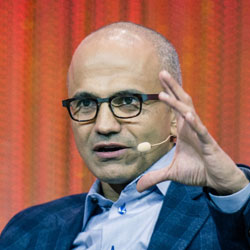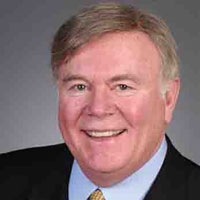Computer history - 2014
Major computer events in 2014

Satya Nadella became Microsoft CEO on February 4, 2014.
2014 computer and technology top terms
The following are some top computer and technology-related terms in alphabetical order that were introduced or popularized in 2014.
New computer products and services introduced in 2014
Squarespace was introduced in January 2014.
Kara Swisher and Walter Mossberg introduced a new site called Re/code on January 2, 2014.
Xcoin, a cryptocurrency, was released in January 2014 and later renamed "Dash" in 2015.
Antshares, a cryptocurrency, was released in February 2014, and was later renamed to "NEO"
Blizzard Entertainment released the card game Hearthstone on March 11, 2014.
Monera, a cryptocurrency, was released on April 18, 2014.
Apple introduced macOS X 10.10, code-named Yosemite, at the WWDC (Worldwide Developer Conference) on June 2, 2014. The operating system was made available to everyone on October 16, 2014.
Apple introduced the Swift programming language on June 2, 2014.
OnePlus released the OnePlus One smartphone on June 6, 2014.
Microsoft released the Surface Pro 3 with a second-generation Surface Pen on June 20, 2014.
Android TV was released on June 25, 2014.
The Terraform software from HashiCorp was released on July 28, 2014.
DDR4, the fourth generation of DDR (Double Data Rate) memory, was released in September 2014.
Apple introduced the new iPhone 6, iPhone 6 Plus, and Apple Watch on September 9, 2014. The iPhone 6 was released on September 19, 2014.
Apple introduced the Apple Pay and Force Touch features for its devices on October 20, 2014.
The HTML5 programming language was recommended and released to the public on October 28, 2014, by W3C.
Android version 5.0 (Lollipop) was released on November 3, 2014.
Amazon officially released the Amazon Echo to the public on November 4, 2014.
Amazon introduced the Fire TV Stick on November 19, 2014.
Touch ID was introduced to iPads in 2014 with the release of the iPad Air 2.
Amazon Photos was introduced in 2014.
Aseprite was released in 2014.
The Babel programming language was released in 2014.
Bitstrips released Bitmoji in 2014.
Google introduced Google Classroom in 2014.
Gitter was released in 2014.
Beginning in 2014, GrubHub began offering a delivery service for restaurants that do not deliver.
X laboratory developed the drone-based delivery service Wing in 2014.
Google released Google Cardboard in 2014.
Pearl Abyss released Black Desert Online in 2014.
The Nintendo New 3DS was released in 2014.
The PCIe (PCI Express) m.2 connection standard, introduced in 2014, offers a maximum real-world throughput of approximately 4 GB/s.
Samsung released the Galaxy Tab S, Galaxy S5, Galaxy Note Edge, and Galaxy Note 4 in 2014.
Software developer Fernando Pérez released Jupyter in 2014.
Streamlabs was introduced in 2014.
TOTAL VPN, a virtual network solutions company, was founded in 2014.
Vidme was introduced as Viddme in 2014.
Windows Insider was introduced with the Windows 10 update in 2014.
Computer and technology-related events in 2014
All Composers Desktop Project software became open-source.
Reddit reaches 170 million registered users.
On February 7, 2014, the bitcoin exchange Mt.Gox filed for bankruptcy after $460 million was reported stolen by hackers and another $27.4 million went missing from its bank accounts.
Amazon Fire TV was released on April 12, 2014.
In April 2014, Glu, the new owner of the GameSpy servers, announced it would shut down the remaining operational GameSpy servers on May 31, 2014. The shutdown caused a lot of older games like Battlefield 2, Crysis, Star Wars: Battlefront, and many games on Nintendo to lose online play.
The development of TrueCrypt was discontinued on May 28, 2014.
Amazon Fire Phone was released on July 25, 2014.
The ALS Ice Bucket Challenge went viral in July 2014.
In July 2014, Tilera was acquired by EZchip Semiconductor.
The Macworld magazine announced it ceased all print production on September 10, 2014.
Gamergate started in August 2014.
Amazon purchased Twitch.tv in August 2014 for $970 million.
Information on the Shellshock vulnerability was released to developers in September 2014.
Microsoft announced on September 30, 2014, the next version of Windows, which became Windows 10.
On October 1, 2014, a Japanese man was sentenced to two years in prison for manufacturing 3D-printed guns. He became the first person to serve time for a 3D-printed gun.
The Serial podcast was released on October 3, 2014.
Apple released the Yosemite version of OS X on October 16, 2014.
The Silk Road 2.0 was shut down on November 6, 2014.
The FIDO Alliance released its first official specification on December 9, 2014.
On December 9, 2014, IBM announced it would no longer support Lotus Symphony.
The largest bug bounty was awarded in 2014 when Unix specialist Stéphane Chazelas discovered the Shell Shock vulnerability in the widely used Bash shell.
Nick Bostrom's hypothetical paperclip problem was introduced in 2014.
The term "Web3" was coined by Gavin Wood in 2014.
Computer companies and organizations founded in 2014
Addlink Technology was founded in 2014.
LumaForge was founded in 2014.
Porkbun was founded in 2014 by Ray King and Peter Brual.
RIOTORO was founded in 2014.
Yondr was founded by Graham Dugoni in 2014.
Computer company events in 2014
On January 7, 2014, Commtouch changed its name to CYREN.
Google announced on January 13, 2014, that it had agreed to acquire Nest for $3.2 billion in cash. Nest was the manufacturer of the Nest thermostats and smoke alarms.
Lenovo announced on January 23, 2014, that it planned to acquire IBM's x86 server business.
On January 26, 2014, Google agreed to acquire DeepMind Technologies for $650 million.
On January 29, 2014, Google announced it would sell Motorola Mobility to Lenovo for $2.91 billion.
Sony announced on February 6, 2014 it would sell its PC (personal computer) business to a Japanese investment firm.
The W3C approved the Turtle or Terse RDF (Resource Description Framework) Triple Language on February 25, 2014.
Bit9 acquired Carbon Black, a computer security firm, in February 2014.
Vue was released in February 2014.
On April 11, 2014, Samsung released the Galaxy S5 smartphone to the public.
The Nokia deal with Microsoft was completed on April 25, 2014, making Nokia now Microsoft Mobile in a deal totaling $7.17 billion.
On June 20, 2014, Google announced it would acquire Dropcam, the video home monitoring company, for $555 million.
On September 15, 2014, Microsoft announced it purchased Mojang, the maker of Minecraft, for $2.5 billion.
On September 22, 2014, Fullscreen, Inc. became a subsidiary of Otter Media.
On September 30, 2014, Google announced it would stop the Orkut social networking site.
Global Village Consulting, Inc. was renamed Gevity Consulting, Inc. in 2014.
On October 8, 2014, the Time Warner Cable and Comcast merger was approved.
AFREEY went out of business in 2014.
In 2014, both Panasonic and Samsung announced they were discontinuing plasma screens and no longer planned to make plasma TVs.
In 2014, Novell became part of Micro Focus.
Shutterstock acquired Webdam in 2014.
SiPix was acquired by its largest competitor, E Ink, in 2014.
Ukash was acquired by the Skrill Group and merged into the PaySafeCard online purchasing system.
Whatsapp was purchased by Facebook in 2014.
Computer-related TV shows and movies released in 2014
HBO's Silicon Valley comedy series, created by Mike Judge, first airs on April 6, 2014. The show follows the struggle of Richard Hendricks, a Silicon Valley engineer, trying to build a company called Pied Piper.
The Imitation Game was released on August 29, 2014. The biography movie is about Alan Turing and his struggles to crack the German Enigma Code.
Citizenfour was released on October 24, 2014. It is a documentary about the first of many meetings between reporters and Edward Snowden.
The movie Automata, about the human race being at the end while the robot race is at its beginning, was released in 2014.
Ex Machina, a movie about a programmer selected to participate in evaluating the human qualities of a highly advanced humanoid AI (Artificial Intelligence), was released in 2014.
From Bedrooms to Billions, a documentary about the British video games industry from 1979 to 2014.
The Hacker Wars documentary, which takes you to the front lines of the high-stakes battle over the fate of the Internet, freedom, and privacy, was released in 2014.
Halt and Catch Fire, a TV series that follows people in the 1980s during the technological revolution that helped lead to our current information society was released in 2014.
Print the Legend documentary, which follows people racing to bring 3D printing to your home, was released in 2014.
RoboCop, a modern take on the 1987 RoboCop where a 2028 injured cop is remade into a part-man part-robot police officer, was released in 2014.
Softwaring Hard documentary about the world of software makers, was released in 2014.
The Internet's Own Boy: The Story of Aaron Swartz documentary biography on Aaron Swartz, who took his own life at the age of 26, was released in 2014.
The Signal, a movie about a computer genius who draws in two friends on a road trip, was released in 2014.
Transcendence, a movie about a computer scientist driven to create an artificial intelligence system uploads his own consiousness into his own system, was released in 2014.
Who Am I, a movie about a German computer whiz who joins a subversive hacker group hoping to be noticed on the world's stage, was released in 2014.
Discontinued products and services in 2014
G4 was officially shut down on December 31, 2014.
Windows XP support ended on April 8, 2014.
Development of Symbian OS (operating system) was discontinued in May 2014.
Facebook removed Poke from the app store in May 2014.
The PlayStation Portable consoles were discontinued in 2014.
Computer pioneer deaths in 2014

Patrick McGovern passed away on March 19, 2014 (Age: 76).
Georgy Adelson-Velsky passed away on April 26, 2014 (Age:92).
Heinz Zemanek passed away on July 16, 2014 (Age: 94).
Karl Ganzhorn passed away on August 25, 2014 (Age: 93).
Andrew Kay passed away on August 28, 2014 (Age: 95).
Nikolay Brusentsov passed away on December 4, 2014 (Age: 89).
Ralph Baer passed away on December 6, 2014 (Age: 92).
